Career Counselling Report: Narrative Career Counselling Analysis
VerifiedAdded on 2020/02/24
|18
|4246
|35
Report
AI Summary
This report on career counselling begins with a personal reflection on the author's experiences and insights as a career counselor, emphasizing the importance of building client confidence, understanding their unique challenges, and fostering a nurturing relationship. The reflection highlights the counselor's journey of self-improvement and the significance of aligning their own career with the advice they offer. The report then transitions into a literature review, exploring the evolution of narrative career counselling, its methods, and its advantages and disadvantages. It examines how narrative techniques like storytelling and interviews are used to help clients construct their career identities, make meaningful career decisions, and navigate the complexities of the modern job market. The review also contrasts traditional and modern approaches to career counselling, discusses the influence of cultural and contextual factors, and assesses the effectiveness of various methods in guiding clients towards sustainable career paths. The report draws from various sources to provide a comprehensive overview of the field.
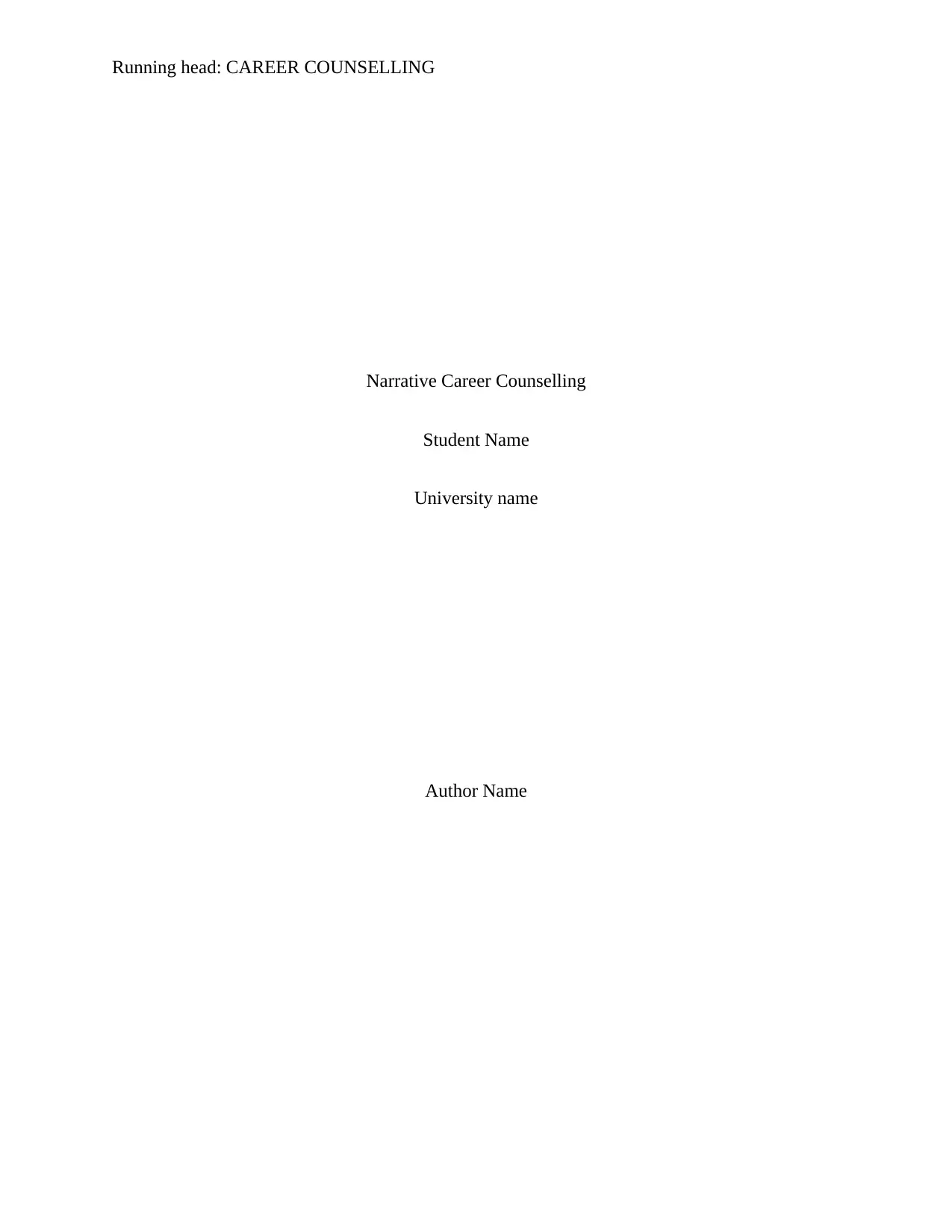
Running head: CAREER COUNSELLING
Narrative Career Counselling
Student Name
University name
Author Name
Narrative Career Counselling
Student Name
University name
Author Name
Paraphrase This Document
Need a fresh take? Get an instant paraphrase of this document with our AI Paraphraser
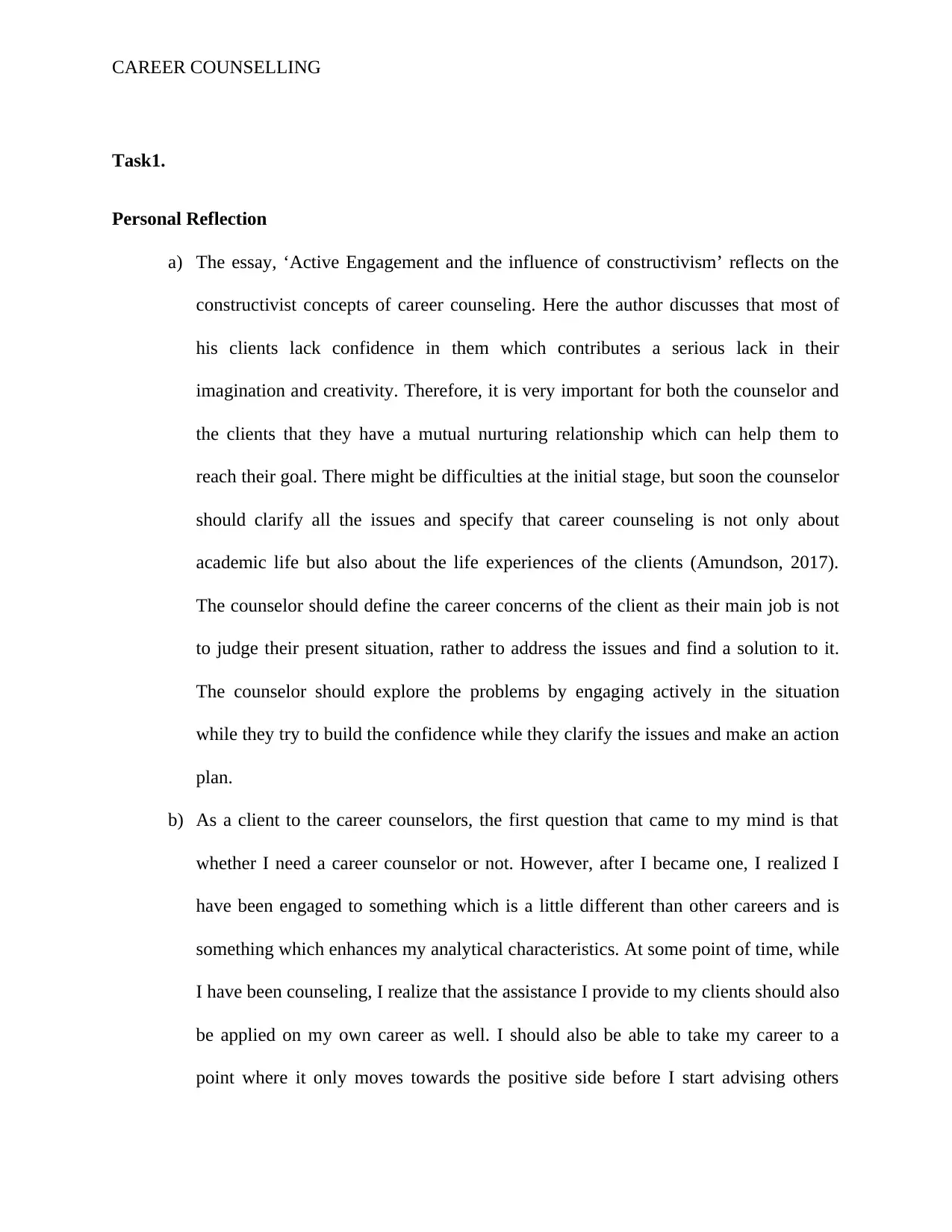
CAREER COUNSELLING
Task1.
Personal Reflection
a) The essay, ‘Active Engagement and the influence of constructivism’ reflects on the
constructivist concepts of career counseling. Here the author discusses that most of
his clients lack confidence in them which contributes a serious lack in their
imagination and creativity. Therefore, it is very important for both the counselor and
the clients that they have a mutual nurturing relationship which can help them to
reach their goal. There might be difficulties at the initial stage, but soon the counselor
should clarify all the issues and specify that career counseling is not only about
academic life but also about the life experiences of the clients (Amundson, 2017).
The counselor should define the career concerns of the client as their main job is not
to judge their present situation, rather to address the issues and find a solution to it.
The counselor should explore the problems by engaging actively in the situation
while they try to build the confidence while they clarify the issues and make an action
plan.
b) As a client to the career counselors, the first question that came to my mind is that
whether I need a career counselor or not. However, after I became one, I realized I
have been engaged to something which is a little different than other careers and is
something which enhances my analytical characteristics. At some point of time, while
I have been counseling, I realize that the assistance I provide to my clients should also
be applied on my own career as well. I should also be able to take my career to a
point where it only moves towards the positive side before I start advising others
Task1.
Personal Reflection
a) The essay, ‘Active Engagement and the influence of constructivism’ reflects on the
constructivist concepts of career counseling. Here the author discusses that most of
his clients lack confidence in them which contributes a serious lack in their
imagination and creativity. Therefore, it is very important for both the counselor and
the clients that they have a mutual nurturing relationship which can help them to
reach their goal. There might be difficulties at the initial stage, but soon the counselor
should clarify all the issues and specify that career counseling is not only about
academic life but also about the life experiences of the clients (Amundson, 2017).
The counselor should define the career concerns of the client as their main job is not
to judge their present situation, rather to address the issues and find a solution to it.
The counselor should explore the problems by engaging actively in the situation
while they try to build the confidence while they clarify the issues and make an action
plan.
b) As a client to the career counselors, the first question that came to my mind is that
whether I need a career counselor or not. However, after I became one, I realized I
have been engaged to something which is a little different than other careers and is
something which enhances my analytical characteristics. At some point of time, while
I have been counseling, I realize that the assistance I provide to my clients should also
be applied on my own career as well. I should also be able to take my career to a
point where it only moves towards the positive side before I start advising others
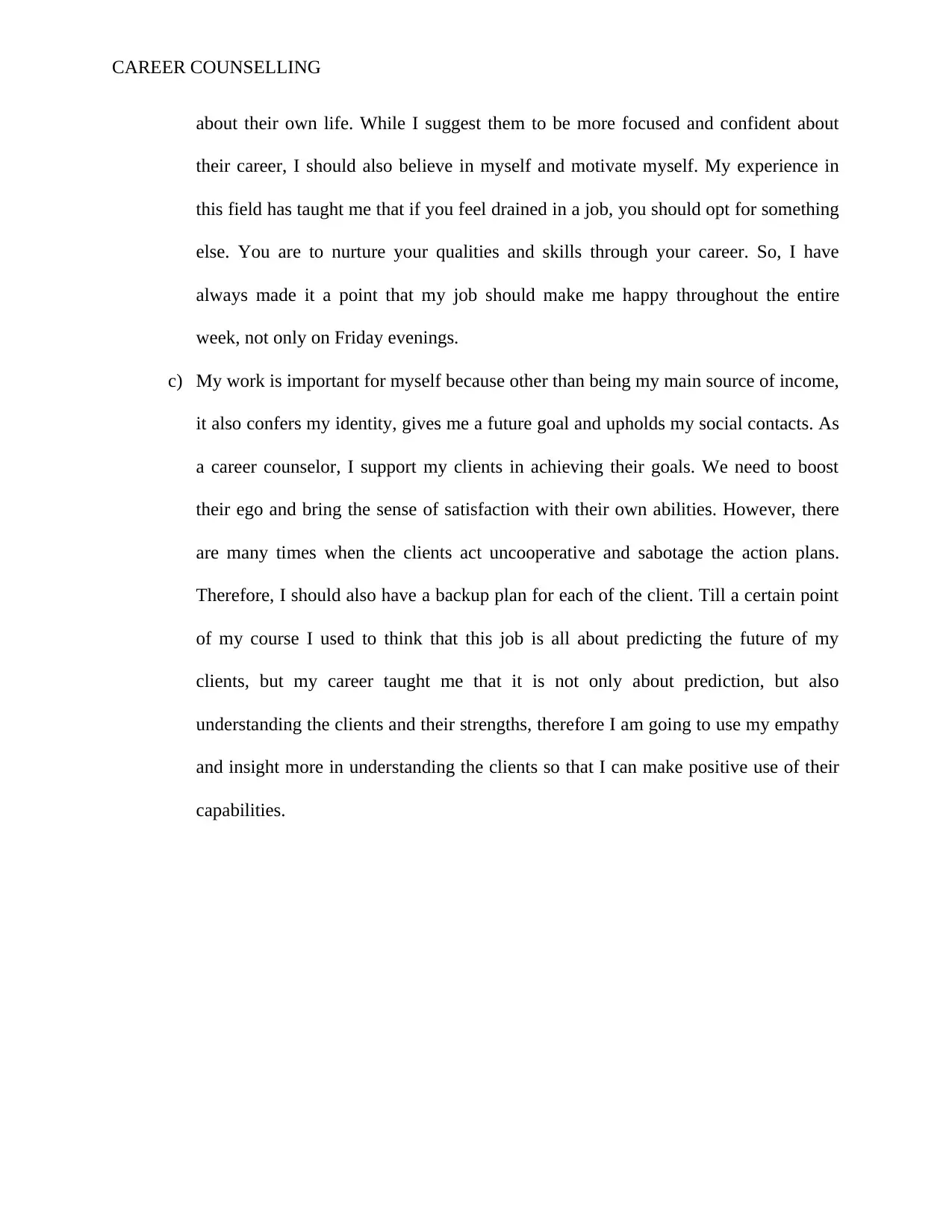
CAREER COUNSELLING
about their own life. While I suggest them to be more focused and confident about
their career, I should also believe in myself and motivate myself. My experience in
this field has taught me that if you feel drained in a job, you should opt for something
else. You are to nurture your qualities and skills through your career. So, I have
always made it a point that my job should make me happy throughout the entire
week, not only on Friday evenings.
c) My work is important for myself because other than being my main source of income,
it also confers my identity, gives me a future goal and upholds my social contacts. As
a career counselor, I support my clients in achieving their goals. We need to boost
their ego and bring the sense of satisfaction with their own abilities. However, there
are many times when the clients act uncooperative and sabotage the action plans.
Therefore, I should also have a backup plan for each of the client. Till a certain point
of my course I used to think that this job is all about predicting the future of my
clients, but my career taught me that it is not only about prediction, but also
understanding the clients and their strengths, therefore I am going to use my empathy
and insight more in understanding the clients so that I can make positive use of their
capabilities.
about their own life. While I suggest them to be more focused and confident about
their career, I should also believe in myself and motivate myself. My experience in
this field has taught me that if you feel drained in a job, you should opt for something
else. You are to nurture your qualities and skills through your career. So, I have
always made it a point that my job should make me happy throughout the entire
week, not only on Friday evenings.
c) My work is important for myself because other than being my main source of income,
it also confers my identity, gives me a future goal and upholds my social contacts. As
a career counselor, I support my clients in achieving their goals. We need to boost
their ego and bring the sense of satisfaction with their own abilities. However, there
are many times when the clients act uncooperative and sabotage the action plans.
Therefore, I should also have a backup plan for each of the client. Till a certain point
of my course I used to think that this job is all about predicting the future of my
clients, but my career taught me that it is not only about prediction, but also
understanding the clients and their strengths, therefore I am going to use my empathy
and insight more in understanding the clients so that I can make positive use of their
capabilities.
⊘ This is a preview!⊘
Do you want full access?
Subscribe today to unlock all pages.

Trusted by 1+ million students worldwide
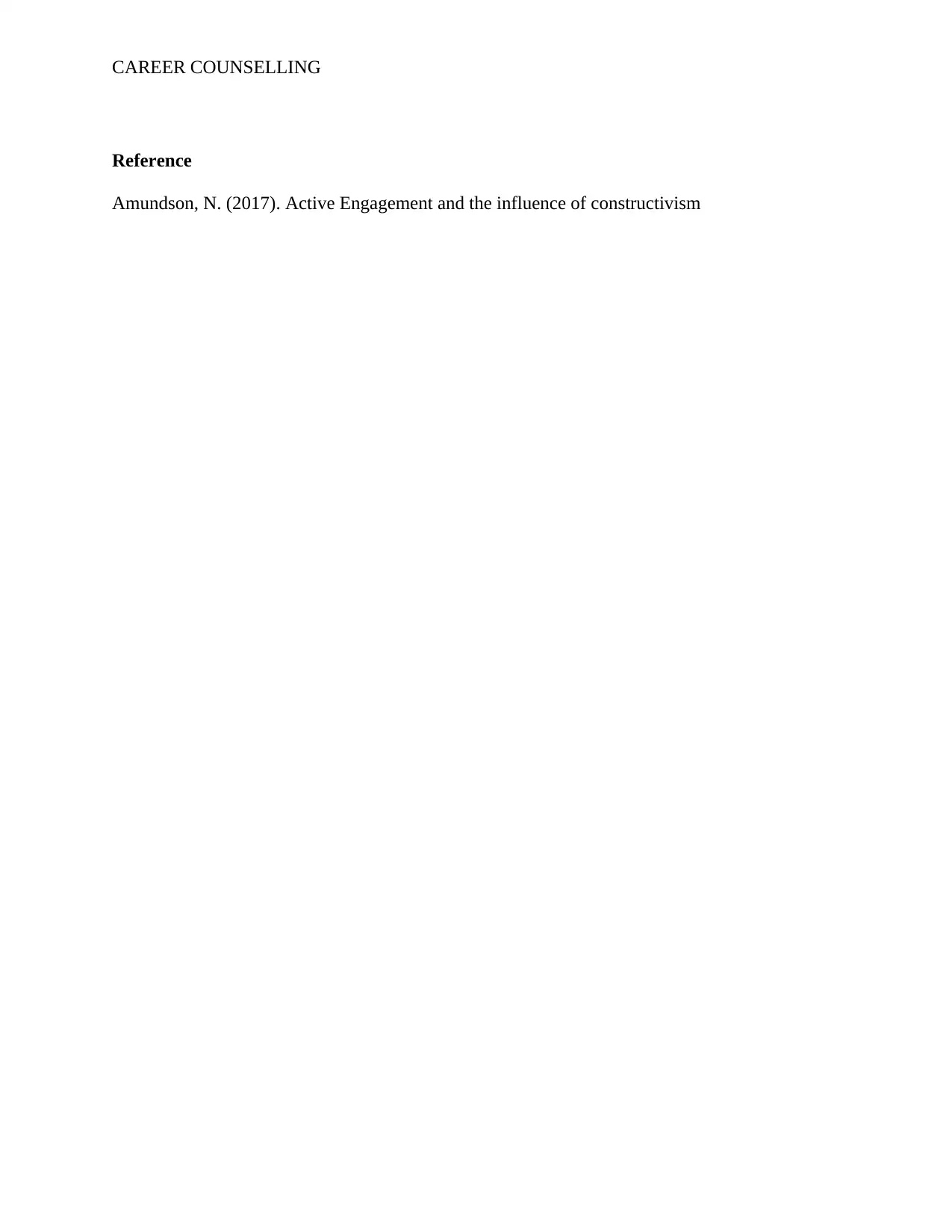
CAREER COUNSELLING
Reference
Amundson, N. (2017). Active Engagement and the influence of constructivism
Reference
Amundson, N. (2017). Active Engagement and the influence of constructivism
Paraphrase This Document
Need a fresh take? Get an instant paraphrase of this document with our AI Paraphraser
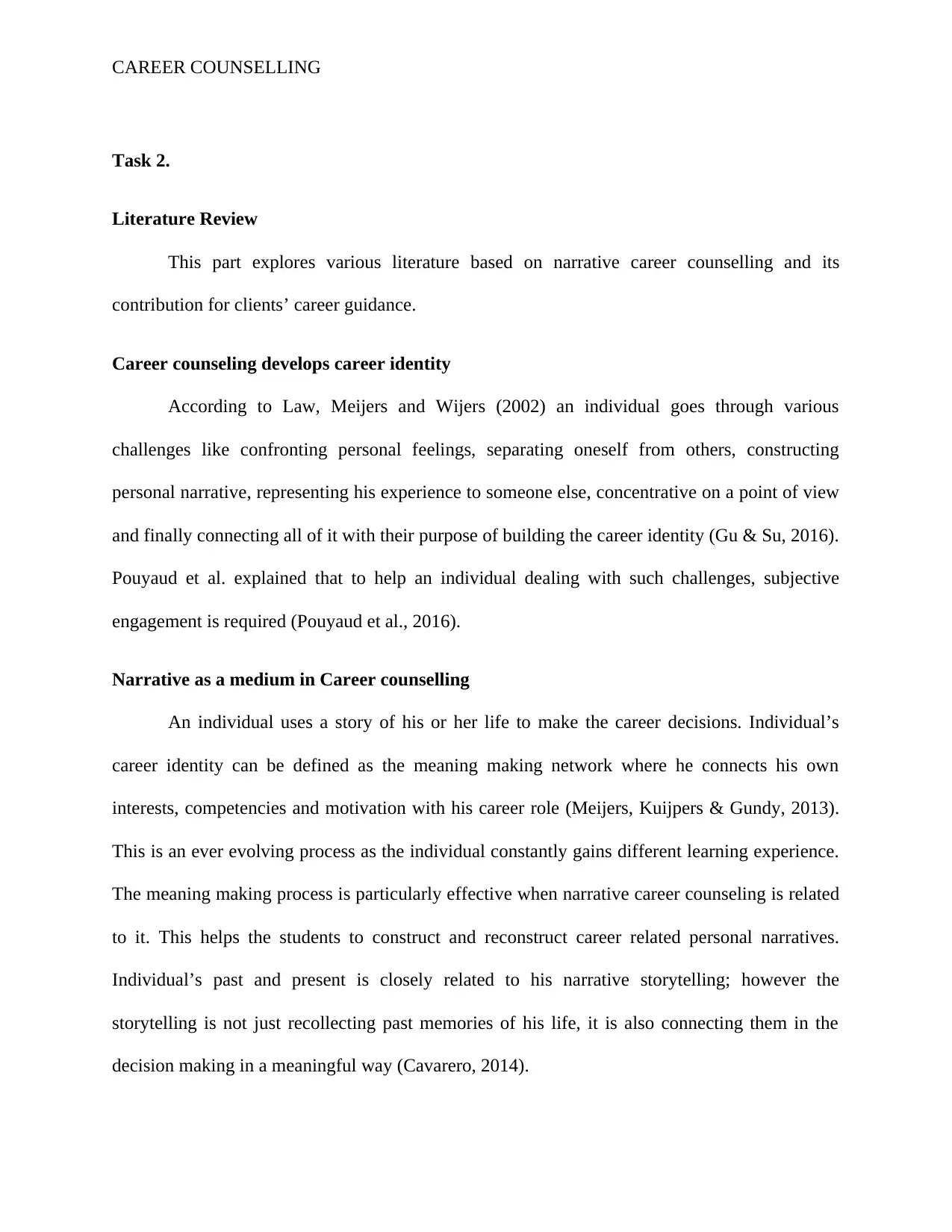
CAREER COUNSELLING
Task 2.
Literature Review
This part explores various literature based on narrative career counselling and its
contribution for clients’ career guidance.
Career counseling develops career identity
According to Law, Meijers and Wijers (2002) an individual goes through various
challenges like confronting personal feelings, separating oneself from others, constructing
personal narrative, representing his experience to someone else, concentrative on a point of view
and finally connecting all of it with their purpose of building the career identity (Gu & Su, 2016).
Pouyaud et al. explained that to help an individual dealing with such challenges, subjective
engagement is required (Pouyaud et al., 2016).
Narrative as a medium in Career counselling
An individual uses a story of his or her life to make the career decisions. Individual’s
career identity can be defined as the meaning making network where he connects his own
interests, competencies and motivation with his career role (Meijers, Kuijpers & Gundy, 2013).
This is an ever evolving process as the individual constantly gains different learning experience.
The meaning making process is particularly effective when narrative career counseling is related
to it. This helps the students to construct and reconstruct career related personal narratives.
Individual’s past and present is closely related to his narrative storytelling; however the
storytelling is not just recollecting past memories of his life, it is also connecting them in the
decision making in a meaningful way (Cavarero, 2014).
Task 2.
Literature Review
This part explores various literature based on narrative career counselling and its
contribution for clients’ career guidance.
Career counseling develops career identity
According to Law, Meijers and Wijers (2002) an individual goes through various
challenges like confronting personal feelings, separating oneself from others, constructing
personal narrative, representing his experience to someone else, concentrative on a point of view
and finally connecting all of it with their purpose of building the career identity (Gu & Su, 2016).
Pouyaud et al. explained that to help an individual dealing with such challenges, subjective
engagement is required (Pouyaud et al., 2016).
Narrative as a medium in Career counselling
An individual uses a story of his or her life to make the career decisions. Individual’s
career identity can be defined as the meaning making network where he connects his own
interests, competencies and motivation with his career role (Meijers, Kuijpers & Gundy, 2013).
This is an ever evolving process as the individual constantly gains different learning experience.
The meaning making process is particularly effective when narrative career counseling is related
to it. This helps the students to construct and reconstruct career related personal narratives.
Individual’s past and present is closely related to his narrative storytelling; however the
storytelling is not just recollecting past memories of his life, it is also connecting them in the
decision making in a meaningful way (Cavarero, 2014).
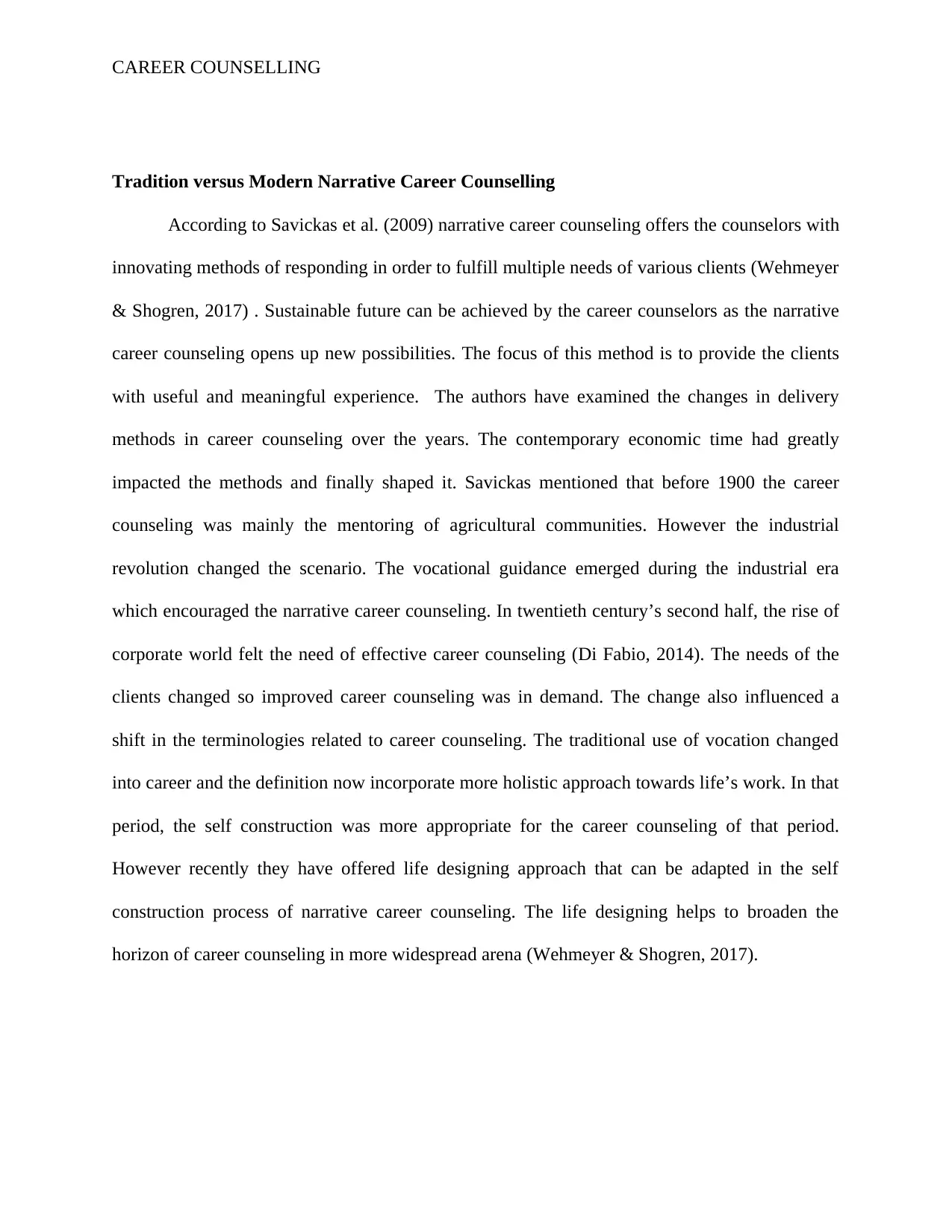
CAREER COUNSELLING
Tradition versus Modern Narrative Career Counselling
According to Savickas et al. (2009) narrative career counseling offers the counselors with
innovating methods of responding in order to fulfill multiple needs of various clients (Wehmeyer
& Shogren, 2017) . Sustainable future can be achieved by the career counselors as the narrative
career counseling opens up new possibilities. The focus of this method is to provide the clients
with useful and meaningful experience. The authors have examined the changes in delivery
methods in career counseling over the years. The contemporary economic time had greatly
impacted the methods and finally shaped it. Savickas mentioned that before 1900 the career
counseling was mainly the mentoring of agricultural communities. However the industrial
revolution changed the scenario. The vocational guidance emerged during the industrial era
which encouraged the narrative career counseling. In twentieth century’s second half, the rise of
corporate world felt the need of effective career counseling (Di Fabio, 2014). The needs of the
clients changed so improved career counseling was in demand. The change also influenced a
shift in the terminologies related to career counseling. The traditional use of vocation changed
into career and the definition now incorporate more holistic approach towards life’s work. In that
period, the self construction was more appropriate for the career counseling of that period.
However recently they have offered life designing approach that can be adapted in the self
construction process of narrative career counseling. The life designing helps to broaden the
horizon of career counseling in more widespread arena (Wehmeyer & Shogren, 2017).
Tradition versus Modern Narrative Career Counselling
According to Savickas et al. (2009) narrative career counseling offers the counselors with
innovating methods of responding in order to fulfill multiple needs of various clients (Wehmeyer
& Shogren, 2017) . Sustainable future can be achieved by the career counselors as the narrative
career counseling opens up new possibilities. The focus of this method is to provide the clients
with useful and meaningful experience. The authors have examined the changes in delivery
methods in career counseling over the years. The contemporary economic time had greatly
impacted the methods and finally shaped it. Savickas mentioned that before 1900 the career
counseling was mainly the mentoring of agricultural communities. However the industrial
revolution changed the scenario. The vocational guidance emerged during the industrial era
which encouraged the narrative career counseling. In twentieth century’s second half, the rise of
corporate world felt the need of effective career counseling (Di Fabio, 2014). The needs of the
clients changed so improved career counseling was in demand. The change also influenced a
shift in the terminologies related to career counseling. The traditional use of vocation changed
into career and the definition now incorporate more holistic approach towards life’s work. In that
period, the self construction was more appropriate for the career counseling of that period.
However recently they have offered life designing approach that can be adapted in the self
construction process of narrative career counseling. The life designing helps to broaden the
horizon of career counseling in more widespread arena (Wehmeyer & Shogren, 2017).
⊘ This is a preview!⊘
Do you want full access?
Subscribe today to unlock all pages.

Trusted by 1+ million students worldwide
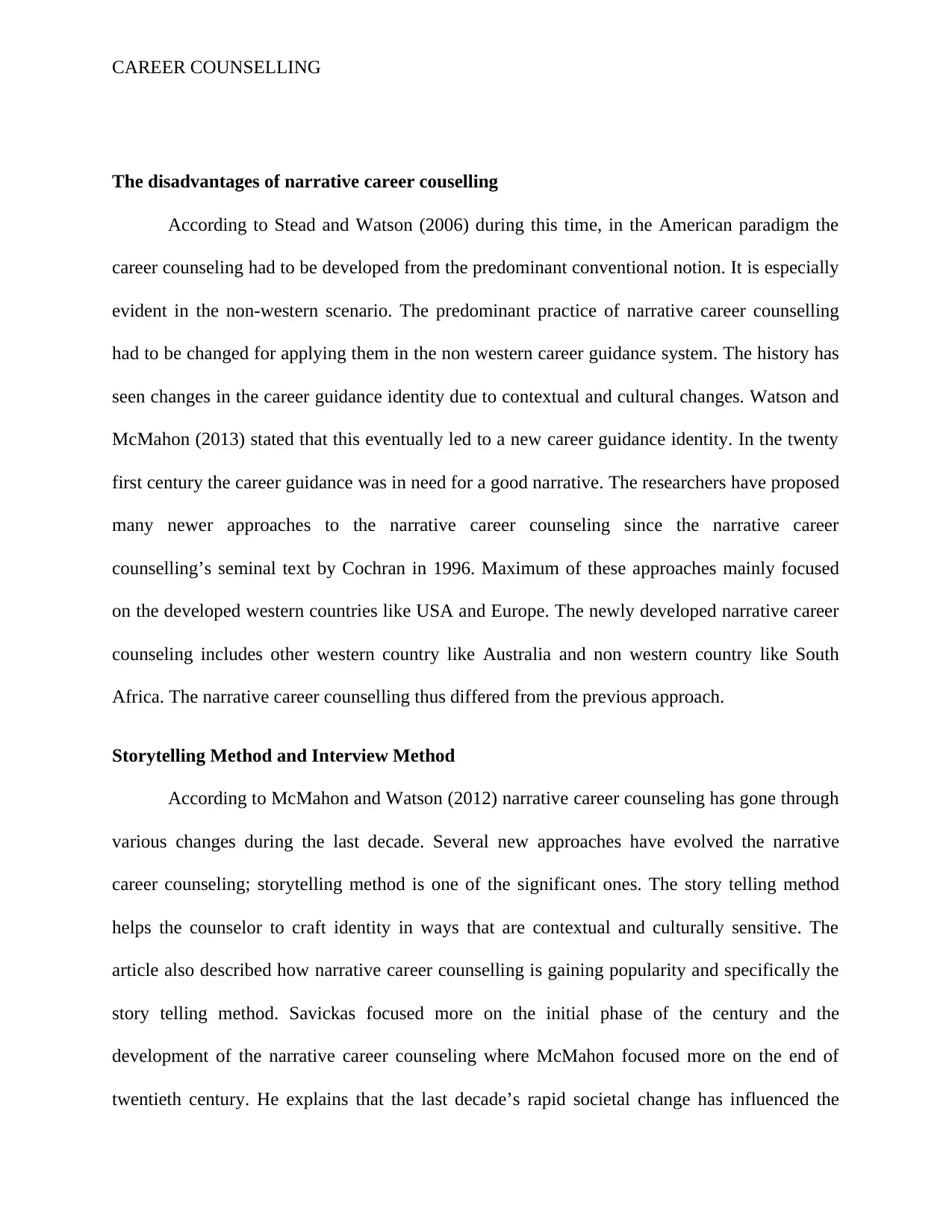
CAREER COUNSELLING
The disadvantages of narrative career couselling
According to Stead and Watson (2006) during this time, in the American paradigm the
career counseling had to be developed from the predominant conventional notion. It is especially
evident in the non-western scenario. The predominant practice of narrative career counselling
had to be changed for applying them in the non western career guidance system. The history has
seen changes in the career guidance identity due to contextual and cultural changes. Watson and
McMahon (2013) stated that this eventually led to a new career guidance identity. In the twenty
first century the career guidance was in need for a good narrative. The researchers have proposed
many newer approaches to the narrative career counseling since the narrative career
counselling’s seminal text by Cochran in 1996. Maximum of these approaches mainly focused
on the developed western countries like USA and Europe. The newly developed narrative career
counseling includes other western country like Australia and non western country like South
Africa. The narrative career counselling thus differed from the previous approach.
Storytelling Method and Interview Method
According to McMahon and Watson (2012) narrative career counseling has gone through
various changes during the last decade. Several new approaches have evolved the narrative
career counseling; storytelling method is one of the significant ones. The story telling method
helps the counselor to craft identity in ways that are contextual and culturally sensitive. The
article also described how narrative career counselling is gaining popularity and specifically the
story telling method. Savickas focused more on the initial phase of the century and the
development of the narrative career counseling where McMahon focused more on the end of
twentieth century. He explains that the last decade’s rapid societal change has influenced the
The disadvantages of narrative career couselling
According to Stead and Watson (2006) during this time, in the American paradigm the
career counseling had to be developed from the predominant conventional notion. It is especially
evident in the non-western scenario. The predominant practice of narrative career counselling
had to be changed for applying them in the non western career guidance system. The history has
seen changes in the career guidance identity due to contextual and cultural changes. Watson and
McMahon (2013) stated that this eventually led to a new career guidance identity. In the twenty
first century the career guidance was in need for a good narrative. The researchers have proposed
many newer approaches to the narrative career counseling since the narrative career
counselling’s seminal text by Cochran in 1996. Maximum of these approaches mainly focused
on the developed western countries like USA and Europe. The newly developed narrative career
counseling includes other western country like Australia and non western country like South
Africa. The narrative career counselling thus differed from the previous approach.
Storytelling Method and Interview Method
According to McMahon and Watson (2012) narrative career counseling has gone through
various changes during the last decade. Several new approaches have evolved the narrative
career counseling; storytelling method is one of the significant ones. The story telling method
helps the counselor to craft identity in ways that are contextual and culturally sensitive. The
article also described how narrative career counselling is gaining popularity and specifically the
story telling method. Savickas focused more on the initial phase of the century and the
development of the narrative career counseling where McMahon focused more on the end of
twentieth century. He explains that the last decade’s rapid societal change has influenced the
Paraphrase This Document
Need a fresh take? Get an instant paraphrase of this document with our AI Paraphraser
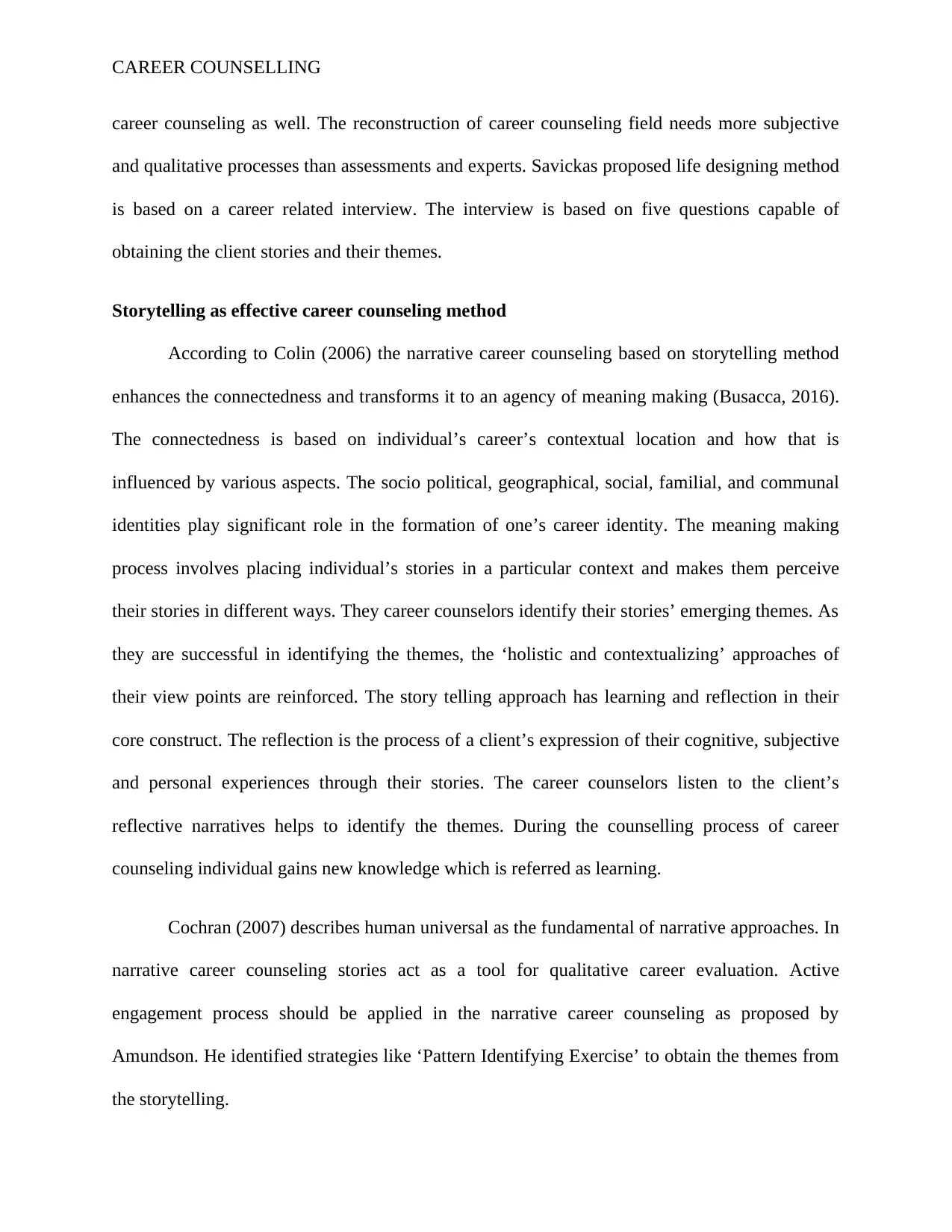
CAREER COUNSELLING
career counseling as well. The reconstruction of career counseling field needs more subjective
and qualitative processes than assessments and experts. Savickas proposed life designing method
is based on a career related interview. The interview is based on five questions capable of
obtaining the client stories and their themes.
Storytelling as effective career counseling method
According to Colin (2006) the narrative career counseling based on storytelling method
enhances the connectedness and transforms it to an agency of meaning making (Busacca, 2016).
The connectedness is based on individual’s career’s contextual location and how that is
influenced by various aspects. The socio political, geographical, social, familial, and communal
identities play significant role in the formation of one’s career identity. The meaning making
process involves placing individual’s stories in a particular context and makes them perceive
their stories in different ways. They career counselors identify their stories’ emerging themes. As
they are successful in identifying the themes, the ‘holistic and contextualizing’ approaches of
their view points are reinforced. The story telling approach has learning and reflection in their
core construct. The reflection is the process of a client’s expression of their cognitive, subjective
and personal experiences through their stories. The career counselors listen to the client’s
reflective narratives helps to identify the themes. During the counselling process of career
counseling individual gains new knowledge which is referred as learning.
Cochran (2007) describes human universal as the fundamental of narrative approaches. In
narrative career counseling stories act as a tool for qualitative career evaluation. Active
engagement process should be applied in the narrative career counseling as proposed by
Amundson. He identified strategies like ‘Pattern Identifying Exercise’ to obtain the themes from
the storytelling.
career counseling as well. The reconstruction of career counseling field needs more subjective
and qualitative processes than assessments and experts. Savickas proposed life designing method
is based on a career related interview. The interview is based on five questions capable of
obtaining the client stories and their themes.
Storytelling as effective career counseling method
According to Colin (2006) the narrative career counseling based on storytelling method
enhances the connectedness and transforms it to an agency of meaning making (Busacca, 2016).
The connectedness is based on individual’s career’s contextual location and how that is
influenced by various aspects. The socio political, geographical, social, familial, and communal
identities play significant role in the formation of one’s career identity. The meaning making
process involves placing individual’s stories in a particular context and makes them perceive
their stories in different ways. They career counselors identify their stories’ emerging themes. As
they are successful in identifying the themes, the ‘holistic and contextualizing’ approaches of
their view points are reinforced. The story telling approach has learning and reflection in their
core construct. The reflection is the process of a client’s expression of their cognitive, subjective
and personal experiences through their stories. The career counselors listen to the client’s
reflective narratives helps to identify the themes. During the counselling process of career
counseling individual gains new knowledge which is referred as learning.
Cochran (2007) describes human universal as the fundamental of narrative approaches. In
narrative career counseling stories act as a tool for qualitative career evaluation. Active
engagement process should be applied in the narrative career counseling as proposed by
Amundson. He identified strategies like ‘Pattern Identifying Exercise’ to obtain the themes from
the storytelling.
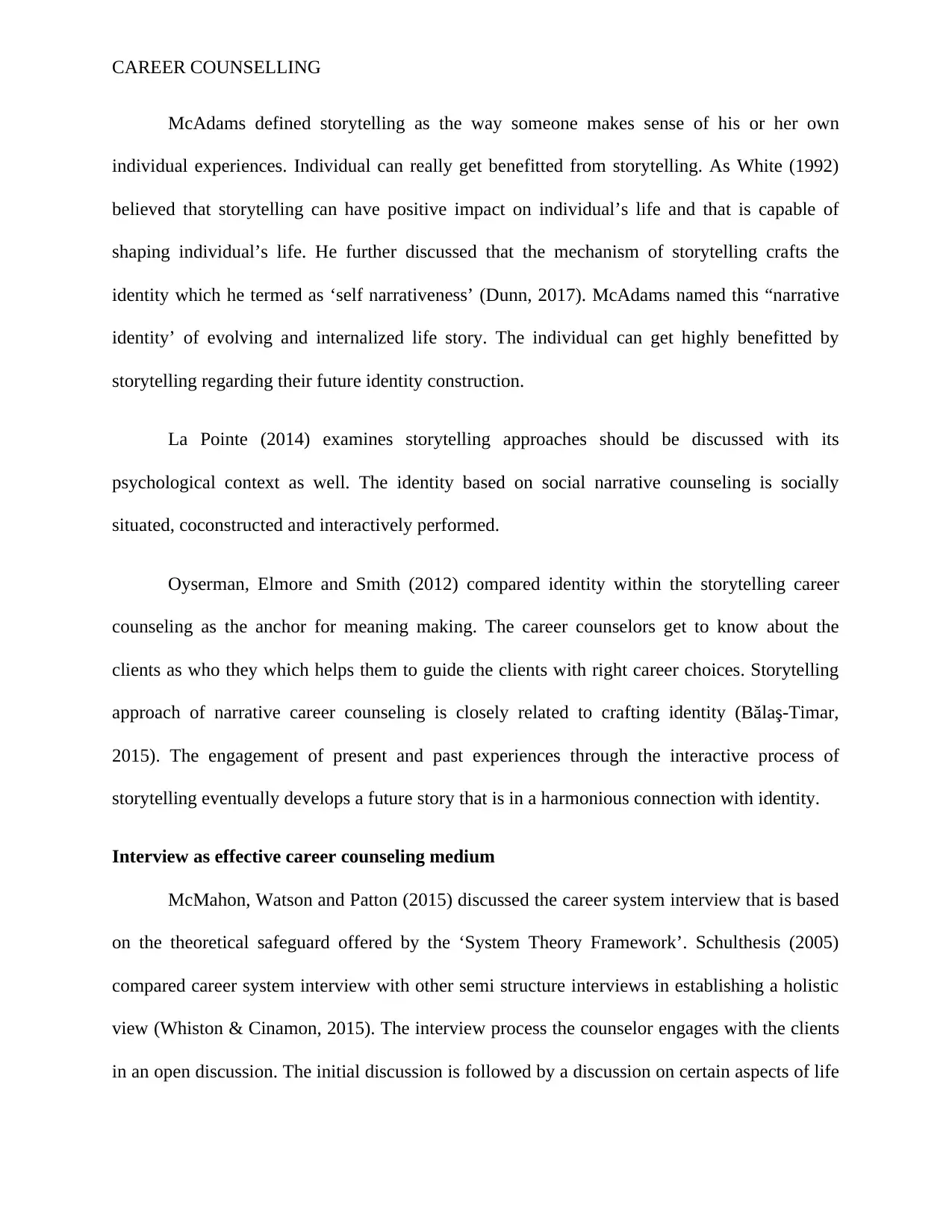
CAREER COUNSELLING
McAdams defined storytelling as the way someone makes sense of his or her own
individual experiences. Individual can really get benefitted from storytelling. As White (1992)
believed that storytelling can have positive impact on individual’s life and that is capable of
shaping individual’s life. He further discussed that the mechanism of storytelling crafts the
identity which he termed as ‘self narrativeness’ (Dunn, 2017). McAdams named this “narrative
identity’ of evolving and internalized life story. The individual can get highly benefitted by
storytelling regarding their future identity construction.
La Pointe (2014) examines storytelling approaches should be discussed with its
psychological context as well. The identity based on social narrative counseling is socially
situated, coconstructed and interactively performed.
Oyserman, Elmore and Smith (2012) compared identity within the storytelling career
counseling as the anchor for meaning making. The career counselors get to know about the
clients as who they which helps them to guide the clients with right career choices. Storytelling
approach of narrative career counseling is closely related to crafting identity (Bălaş-Timar,
2015). The engagement of present and past experiences through the interactive process of
storytelling eventually develops a future story that is in a harmonious connection with identity.
Interview as effective career counseling medium
McMahon, Watson and Patton (2015) discussed the career system interview that is based
on the theoretical safeguard offered by the ‘System Theory Framework’. Schulthesis (2005)
compared career system interview with other semi structure interviews in establishing a holistic
view (Whiston & Cinamon, 2015). The interview process the counselor engages with the clients
in an open discussion. The initial discussion is followed by a discussion on certain aspects of life
McAdams defined storytelling as the way someone makes sense of his or her own
individual experiences. Individual can really get benefitted from storytelling. As White (1992)
believed that storytelling can have positive impact on individual’s life and that is capable of
shaping individual’s life. He further discussed that the mechanism of storytelling crafts the
identity which he termed as ‘self narrativeness’ (Dunn, 2017). McAdams named this “narrative
identity’ of evolving and internalized life story. The individual can get highly benefitted by
storytelling regarding their future identity construction.
La Pointe (2014) examines storytelling approaches should be discussed with its
psychological context as well. The identity based on social narrative counseling is socially
situated, coconstructed and interactively performed.
Oyserman, Elmore and Smith (2012) compared identity within the storytelling career
counseling as the anchor for meaning making. The career counselors get to know about the
clients as who they which helps them to guide the clients with right career choices. Storytelling
approach of narrative career counseling is closely related to crafting identity (Bălaş-Timar,
2015). The engagement of present and past experiences through the interactive process of
storytelling eventually develops a future story that is in a harmonious connection with identity.
Interview as effective career counseling medium
McMahon, Watson and Patton (2015) discussed the career system interview that is based
on the theoretical safeguard offered by the ‘System Theory Framework’. Schulthesis (2005)
compared career system interview with other semi structure interviews in establishing a holistic
view (Whiston & Cinamon, 2015). The interview process the counselor engages with the clients
in an open discussion. The initial discussion is followed by a discussion on certain aspects of life
⊘ This is a preview!⊘
Do you want full access?
Subscribe today to unlock all pages.

Trusted by 1+ million students worldwide
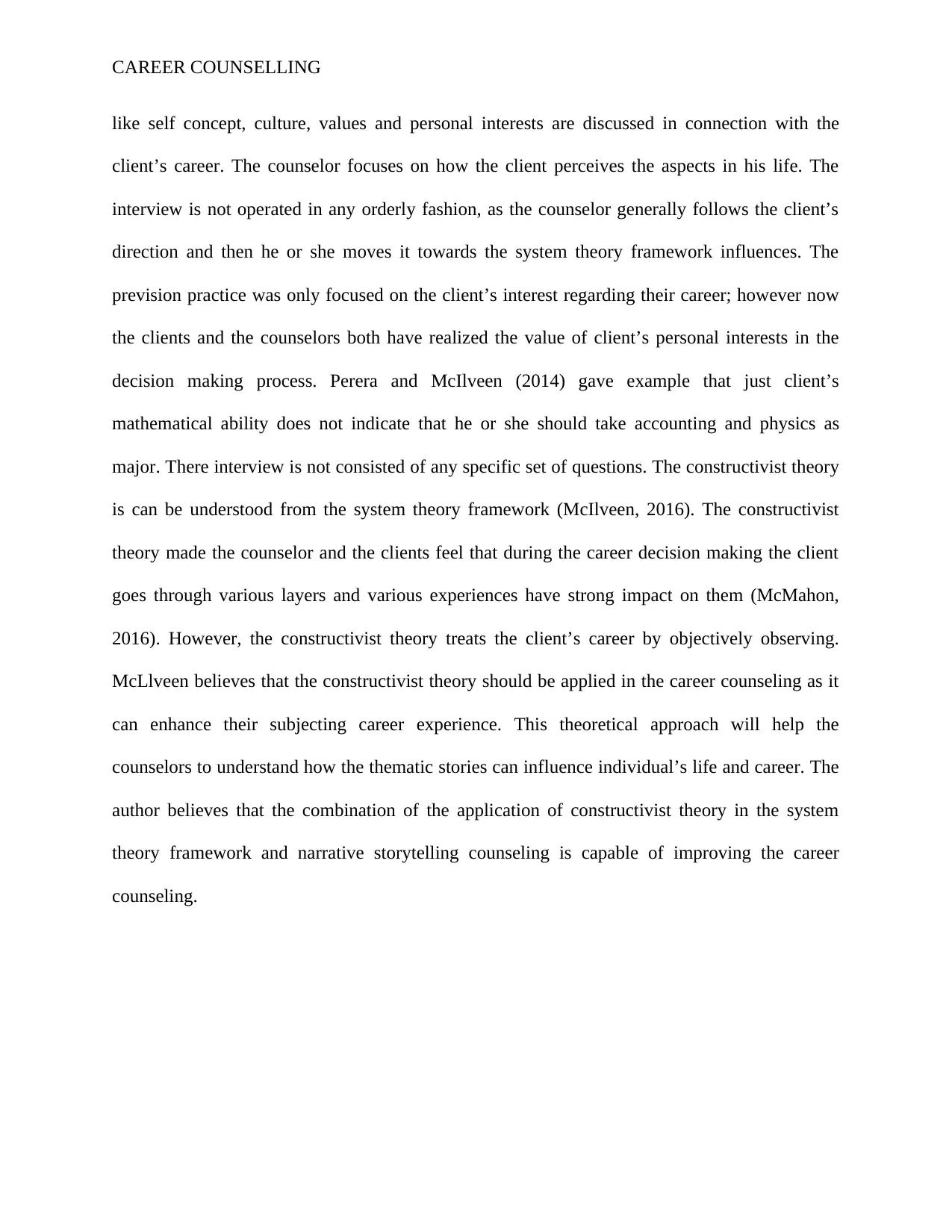
CAREER COUNSELLING
like self concept, culture, values and personal interests are discussed in connection with the
client’s career. The counselor focuses on how the client perceives the aspects in his life. The
interview is not operated in any orderly fashion, as the counselor generally follows the client’s
direction and then he or she moves it towards the system theory framework influences. The
prevision practice was only focused on the client’s interest regarding their career; however now
the clients and the counselors both have realized the value of client’s personal interests in the
decision making process. Perera and McIlveen (2014) gave example that just client’s
mathematical ability does not indicate that he or she should take accounting and physics as
major. There interview is not consisted of any specific set of questions. The constructivist theory
is can be understood from the system theory framework (McIlveen, 2016). The constructivist
theory made the counselor and the clients feel that during the career decision making the client
goes through various layers and various experiences have strong impact on them (McMahon,
2016). However, the constructivist theory treats the client’s career by objectively observing.
McLlveen believes that the constructivist theory should be applied in the career counseling as it
can enhance their subjecting career experience. This theoretical approach will help the
counselors to understand how the thematic stories can influence individual’s life and career. The
author believes that the combination of the application of constructivist theory in the system
theory framework and narrative storytelling counseling is capable of improving the career
counseling.
like self concept, culture, values and personal interests are discussed in connection with the
client’s career. The counselor focuses on how the client perceives the aspects in his life. The
interview is not operated in any orderly fashion, as the counselor generally follows the client’s
direction and then he or she moves it towards the system theory framework influences. The
prevision practice was only focused on the client’s interest regarding their career; however now
the clients and the counselors both have realized the value of client’s personal interests in the
decision making process. Perera and McIlveen (2014) gave example that just client’s
mathematical ability does not indicate that he or she should take accounting and physics as
major. There interview is not consisted of any specific set of questions. The constructivist theory
is can be understood from the system theory framework (McIlveen, 2016). The constructivist
theory made the counselor and the clients feel that during the career decision making the client
goes through various layers and various experiences have strong impact on them (McMahon,
2016). However, the constructivist theory treats the client’s career by objectively observing.
McLlveen believes that the constructivist theory should be applied in the career counseling as it
can enhance their subjecting career experience. This theoretical approach will help the
counselors to understand how the thematic stories can influence individual’s life and career. The
author believes that the combination of the application of constructivist theory in the system
theory framework and narrative storytelling counseling is capable of improving the career
counseling.
Paraphrase This Document
Need a fresh take? Get an instant paraphrase of this document with our AI Paraphraser
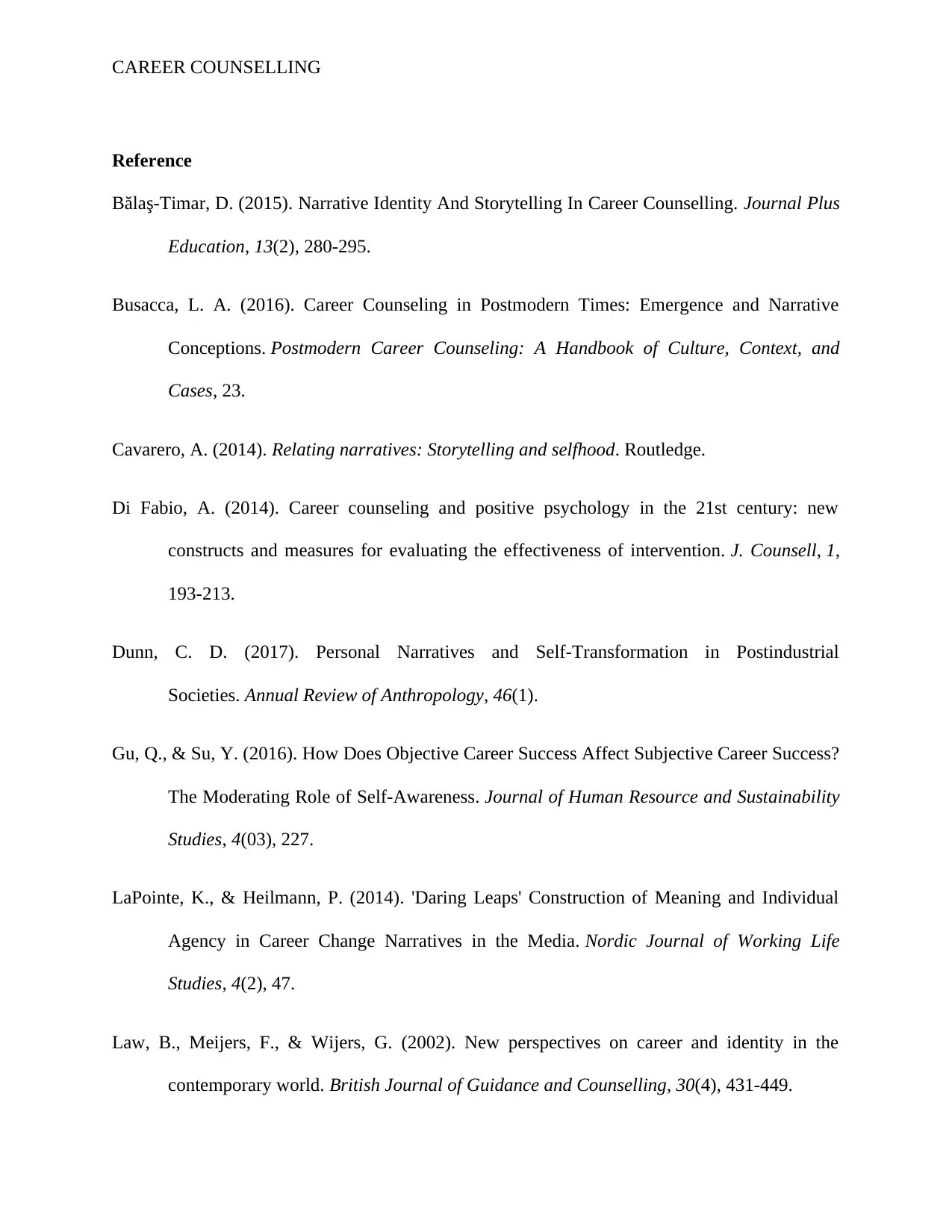
CAREER COUNSELLING
Reference
Bălaş-Timar, D. (2015). Narrative Identity And Storytelling In Career Counselling. Journal Plus
Education, 13(2), 280-295.
Busacca, L. A. (2016). Career Counseling in Postmodern Times: Emergence and Narrative
Conceptions. Postmodern Career Counseling: A Handbook of Culture, Context, and
Cases, 23.
Cavarero, A. (2014). Relating narratives: Storytelling and selfhood. Routledge.
Di Fabio, A. (2014). Career counseling and positive psychology in the 21st century: new
constructs and measures for evaluating the effectiveness of intervention. J. Counsell, 1,
193-213.
Dunn, C. D. (2017). Personal Narratives and Self-Transformation in Postindustrial
Societies. Annual Review of Anthropology, 46(1).
Gu, Q., & Su, Y. (2016). How Does Objective Career Success Affect Subjective Career Success?
The Moderating Role of Self-Awareness. Journal of Human Resource and Sustainability
Studies, 4(03), 227.
LaPointe, K., & Heilmann, P. (2014). 'Daring Leaps' Construction of Meaning and Individual
Agency in Career Change Narratives in the Media. Nordic Journal of Working Life
Studies, 4(2), 47.
Law, B., Meijers, F., & Wijers, G. (2002). New perspectives on career and identity in the
contemporary world. British Journal of Guidance and Counselling, 30(4), 431-449.
Reference
Bălaş-Timar, D. (2015). Narrative Identity And Storytelling In Career Counselling. Journal Plus
Education, 13(2), 280-295.
Busacca, L. A. (2016). Career Counseling in Postmodern Times: Emergence and Narrative
Conceptions. Postmodern Career Counseling: A Handbook of Culture, Context, and
Cases, 23.
Cavarero, A. (2014). Relating narratives: Storytelling and selfhood. Routledge.
Di Fabio, A. (2014). Career counseling and positive psychology in the 21st century: new
constructs and measures for evaluating the effectiveness of intervention. J. Counsell, 1,
193-213.
Dunn, C. D. (2017). Personal Narratives and Self-Transformation in Postindustrial
Societies. Annual Review of Anthropology, 46(1).
Gu, Q., & Su, Y. (2016). How Does Objective Career Success Affect Subjective Career Success?
The Moderating Role of Self-Awareness. Journal of Human Resource and Sustainability
Studies, 4(03), 227.
LaPointe, K., & Heilmann, P. (2014). 'Daring Leaps' Construction of Meaning and Individual
Agency in Career Change Narratives in the Media. Nordic Journal of Working Life
Studies, 4(2), 47.
Law, B., Meijers, F., & Wijers, G. (2002). New perspectives on career and identity in the
contemporary world. British Journal of Guidance and Counselling, 30(4), 431-449.
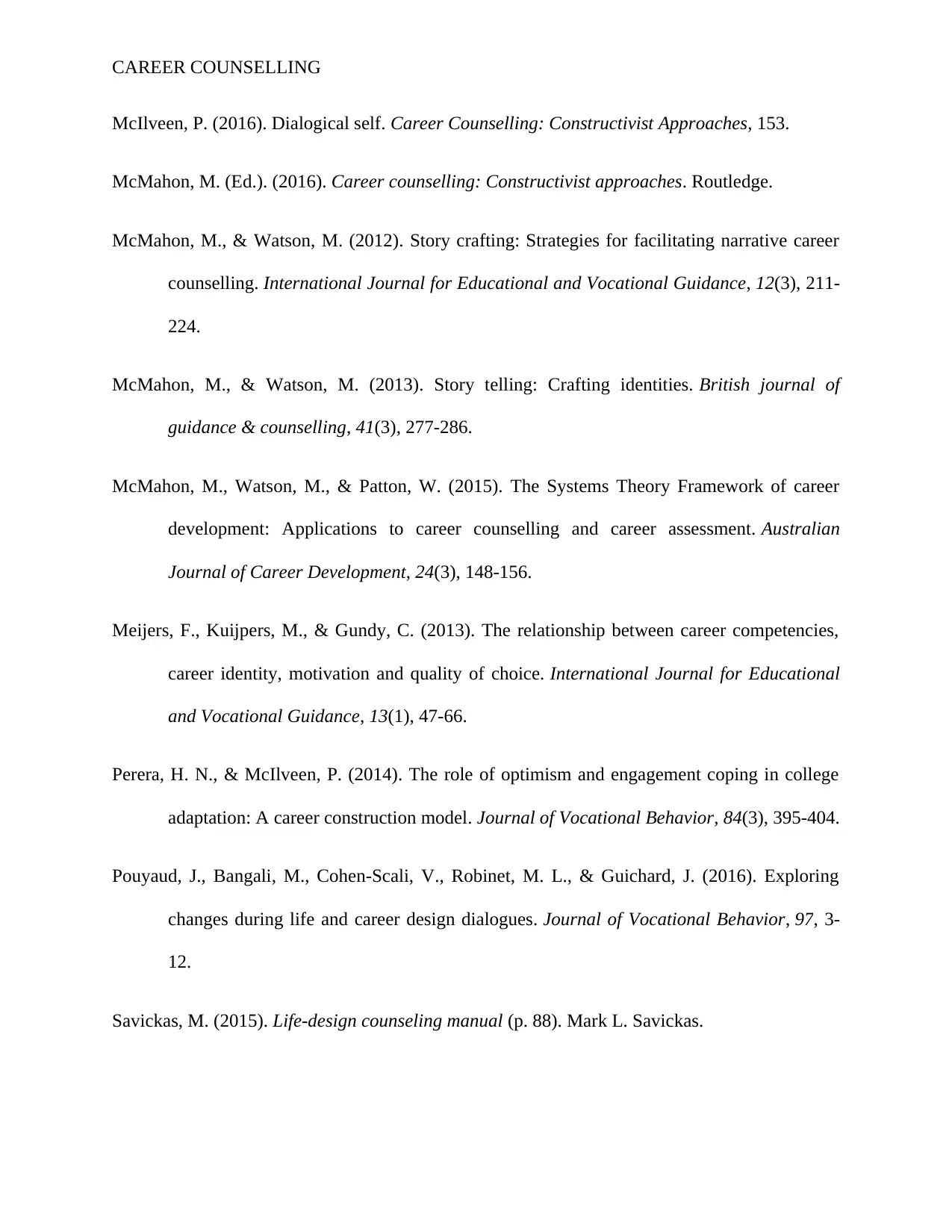
CAREER COUNSELLING
McIlveen, P. (2016). Dialogical self. Career Counselling: Constructivist Approaches, 153.
McMahon, M. (Ed.). (2016). Career counselling: Constructivist approaches. Routledge.
McMahon, M., & Watson, M. (2012). Story crafting: Strategies for facilitating narrative career
counselling. International Journal for Educational and Vocational Guidance, 12(3), 211-
224.
McMahon, M., & Watson, M. (2013). Story telling: Crafting identities. British journal of
guidance & counselling, 41(3), 277-286.
McMahon, M., Watson, M., & Patton, W. (2015). The Systems Theory Framework of career
development: Applications to career counselling and career assessment. Australian
Journal of Career Development, 24(3), 148-156.
Meijers, F., Kuijpers, M., & Gundy, C. (2013). The relationship between career competencies,
career identity, motivation and quality of choice. International Journal for Educational
and Vocational Guidance, 13(1), 47-66.
Perera, H. N., & McIlveen, P. (2014). The role of optimism and engagement coping in college
adaptation: A career construction model. Journal of Vocational Behavior, 84(3), 395-404.
Pouyaud, J., Bangali, M., Cohen-Scali, V., Robinet, M. L., & Guichard, J. (2016). Exploring
changes during life and career design dialogues. Journal of Vocational Behavior, 97, 3-
12.
Savickas, M. (2015). Life-design counseling manual (p. 88). Mark L. Savickas.
McIlveen, P. (2016). Dialogical self. Career Counselling: Constructivist Approaches, 153.
McMahon, M. (Ed.). (2016). Career counselling: Constructivist approaches. Routledge.
McMahon, M., & Watson, M. (2012). Story crafting: Strategies for facilitating narrative career
counselling. International Journal for Educational and Vocational Guidance, 12(3), 211-
224.
McMahon, M., & Watson, M. (2013). Story telling: Crafting identities. British journal of
guidance & counselling, 41(3), 277-286.
McMahon, M., Watson, M., & Patton, W. (2015). The Systems Theory Framework of career
development: Applications to career counselling and career assessment. Australian
Journal of Career Development, 24(3), 148-156.
Meijers, F., Kuijpers, M., & Gundy, C. (2013). The relationship between career competencies,
career identity, motivation and quality of choice. International Journal for Educational
and Vocational Guidance, 13(1), 47-66.
Perera, H. N., & McIlveen, P. (2014). The role of optimism and engagement coping in college
adaptation: A career construction model. Journal of Vocational Behavior, 84(3), 395-404.
Pouyaud, J., Bangali, M., Cohen-Scali, V., Robinet, M. L., & Guichard, J. (2016). Exploring
changes during life and career design dialogues. Journal of Vocational Behavior, 97, 3-
12.
Savickas, M. (2015). Life-design counseling manual (p. 88). Mark L. Savickas.
⊘ This is a preview!⊘
Do you want full access?
Subscribe today to unlock all pages.

Trusted by 1+ million students worldwide
1 out of 18
Related Documents
Your All-in-One AI-Powered Toolkit for Academic Success.
+13062052269
info@desklib.com
Available 24*7 on WhatsApp / Email
![[object Object]](/_next/static/media/star-bottom.7253800d.svg)
Unlock your academic potential
Copyright © 2020–2026 A2Z Services. All Rights Reserved. Developed and managed by ZUCOL.





